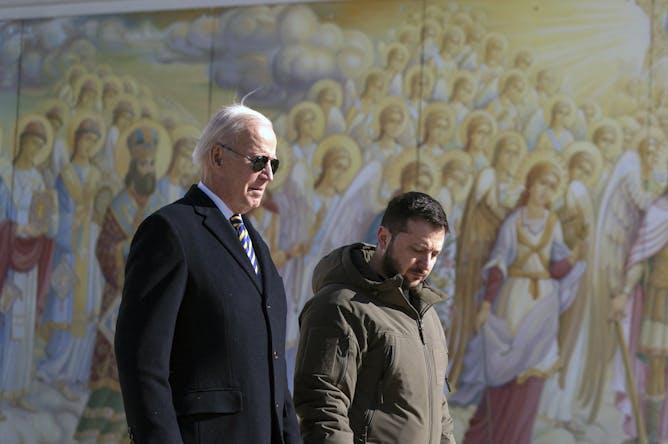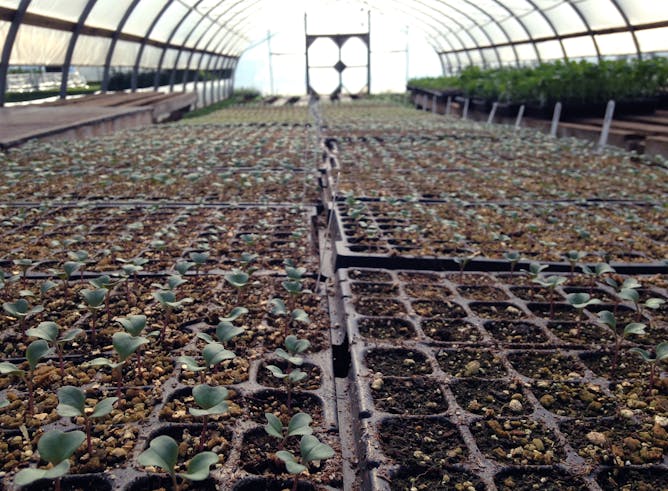|
U.S. President Joe Biden gets a lot of grief for his age, with everyone from late-night comedians to his political foes cracking jokes about the fact that he’s 80. But today in The Conversation Canada, Ronald W. Pruessen of the University of Toronto points out one important benefit of Biden’s age — he remembers the trauma of the war in Vietnam.
Biden was 29 when he was first elected to the U.S. Senate in 1972, when the United States was embroiled in an unwinnable conflict in distant and unfamiliar terrain in southeast Asia. Pruessen argues this has likely influenced Biden’s determination to exercise restraint in terms of any American involvement in the war in Ukraine. Pruessen’s piece offers a fascinating history lesson on Biden predecessors who failed to act as prudently — perhaps because they lacked the wisdom that comes with age.
Also today:
Regards,
|

U.S. President Joe Biden walks with Ukrainian President Volodymyr Zelenskyy near a Kyiv cathedral during Biden’s surprise visit in February 2023.
(AP Photo/Evan Vucci)
Ronald W. Pruessen, University of Toronto
Will Joe Biden be able to maintain the balance that has so far allowed him to avoid serious Vietnam-like errors in Ukraine?
|

Although younger couples tend to share household labour more equitably, women still take on the bulk of home and family responsibilities.
(Shutterstock)
Tina Sharifi, York University, Canada; Ayesha Tabassum, York University, Canada
At the beginning of the pandemic, it was predicted that the shift to remote work would lead to more equal division of domestic labour. Recent research shows this was not the case.
|

Seedlings growing in a greenhouse in the Outaouais region of Québec. It’s time to think deeply about the future of our food system.
Photo by Bryan Dale
Bryan Dale, Bishop's University; Marianne Granger, Bishop's University; Mélodie Anderson, Bishop's University
In light of the changes caused by the pandemic, it is clear that food autonomy as a frame of reference for reorganizing the Québec food system is not enough.
|

The research and vision of Canadian scientists were key foundations of the Human Genome Project. Today, lack of funding threatens discovery research in Canada.
(Pixabay)
John Bergeron, McGill University
On DNA Day, Canada should be inspired by the lifesaving discoveries of its researchers. However, lack of funding threatens Canadian researchers’ ability to meet the challenges of the future.
|

The aptly-titled video ‘Canceling,’ by cultural commentator and YouTuber ContraPoints, crystallized the cancellation video genre.
(Wikipedia)
Erin Keating, University of Manitoba; Jessie Krahn, University of Manitoba
What do YouTuber influencer videos about being ‘cancelled’ share with 17th-century texts? Both were crafted directly in response to audiences in new social spaces.
|

L’exercice physique serait-il inutile au fonctionnement cognitif ?
(Shutterstock)
Matthieu P. Boisgontier, L’Université d’Ottawa/University of Ottawa; Boris Cheval, Université de Genève
Une nouvelle étude met en lumière les bénéfices cognitifs de l’activité physique alors qu’une autre semble dire le contraire, alimentant le débat scientifique sur la question. Voici ce qu’il en est.
|
Business + Economy
|
-
Peyman Khezr, RMIT University
Overconfidence and other cognitive biases help to drive up real estate prices. Here are three techniques used by real estate agents to exploit those biases.
|
|
Culture + Society
|
-
Chantal Gautier, University of Westminster
Young people are more likely to consider some form of open or non-monogamous relationship.
|
|
Environment + Energy
|
-
Don Maier, University of Tennessee
Shipping companies have billions invested in fleets that were built to last decades. Now, the U.S. is calling for zero emissions by 2050, and the EU is raising the cost of fossil fuel use.
|
|